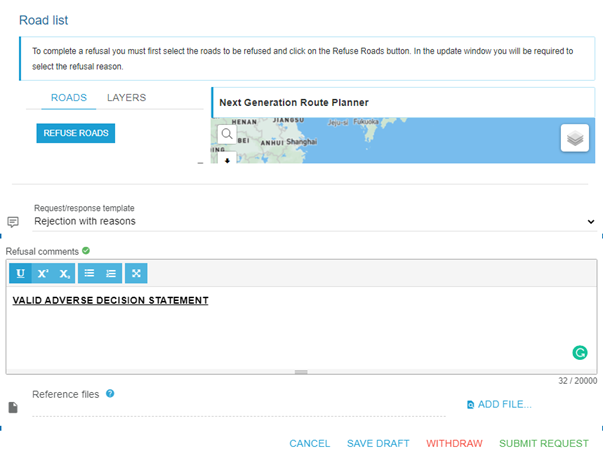Road manager - processing refusals under the HVNL
Road manager - processing refusals under the HVNL
National
Heavy
Vehicle
Regulator
As a road manager, it is important to make informed decisions about granting access to heavy vehicles, considering the safety of all road users and the potential impact on road infrastructure. While granting access to a heavy vehicle has significant productivity benefits, it is equally essential to recognise situations where the potential risks need to be considered by the road manager before granting access to the road network.
What is a valid refusal?
A valid refusal complies with the specific requirements laid out in section 156A of the Heavy Vehicle National Law (HVNL) and relevant guidelines.
For a refusal to be valid, the road manager should be satisfied that the proposed movement will, or is likely to -
- cause damage to infrastructure, or
- impose adverse effects on the community, or
- pose a significant risk to public safety.
It should be clear that the identified risk is significant and can’t be mitigated using road or travel conditions.
In addition to meeting these requirements, a valid refusal must have adequate reasoning and evidence to support the decision. This includes providing a detailed adverse decision statement that outlines the findings on material facts, the reasoning for the decision, and the evidence or other materials used to make the decision.
What is an invalid refusal?
An invalid refusal does not comply with the HVNL or relevant guidelines. For instance, if the road manager has failed to consider relevant evidence or has relied on insufficient evidence in making a decision, the refusal may be deemed invalid. Similarly, if the adverse decision statement lacks the necessary details, it may not be considered a valid refusal.
Another example of an invalid refusal is when the refusal is based on incorrect or irrelevant factors. In such cases, the road manager may need to reassess their decision and provide a more detailed adverse decision statement that outlines the correct reasons for refusal.
Here are some of the most commonly received refusals:
- Refusing infrastructure not owned by the Council – for example, a bridge or intersection. Only the owner or authority of the asset can provide a decision.
- Refusing infrastructure with the reasoning of a signed load limit structure. Operators can apply to the state or relevant road manager for a permit to exempt the sign-posted restriction. Therefore, a road manager must provide additional information as to why the vehicle cannot traverse the infrastructure.
- Refusing a general access vehicle (usually PBS) for dimension reasoning and not the requested weight. For example, if a PBS level 1 vehicle is 20m in length and exceeds mass only, the refusal must be specific to the mass as the vehicle can operate under the HVNL (at 20m without a permit).
- Refusing a heavy vehicle at a requested mass limit assessed as likely to damage road infrastructure instead of conditionally approving it at an acceptable lesser limit (in relevant circumstances).
- Refusing a renewal with little or no information. As approval has been provided previously, additional information is required as to what has changed to create the relevant risk.
- Refusing the whole request instead of identifying and refusing the incompatible section/s of the requested access. NHVR Go records the refusal against each individual section of road. If the entire route is refused, then the data collected will become invalid.
What is an adverse decision statement?
When a road manager decides not to grant access or grants access subject to certain conditions, they must provide an adverse decision statement under section 172 of the HVNL. This statement explains the reasons for the decision, the findings on material facts, and the evidence or other material used in the decision-making process.
The adverse decision statement is crucial in providing transparency and accountability in the decision-making process. It helps ensure that road managers have thoroughly considered the application and have valid reasons for their refusal or imposition of road or travel conditions.
Valid statements help the National Heavy Vehicle Regulator (NHVR) and the applicant to understand the basis of the road manager's decision, which may reduce the number of follow-up queries from both parties. If the statement is unclear or lacks detail, the NHVR may request further explanation or detail to ensure compliance with the HVNL.
When the NHVR deems a refusal invalid
The NHVR may deem a refusal invalid if it is found to be non-compliant with the HVNL requirements. If the NHVR deems a refusal as invalid, it will be sent back to the road manager for review before any decision is accepted. The NHVR does not have the power to reject an adverse decision statement, but it should take reasonable action to ensure all access decisions comply with the HVNL.
Refusals in NHVR Go
To ensure compliance with the HVNL, road managers must include adverse decision statements in  when submitting a refusal. To submit an adverse decision statement, follow these instructions:
when submitting a refusal. To submit an adverse decision statement, follow these instructions:
- Select the ‘Road Manager Request in Draft’ under the 'Decision' tab.
- Under ‘Type’, select ‘Refusal’.
- Tick the individual road segments being refused.
- Once all segments are selected, select ‘Refuse Roads’.
- In the 'Notes' field, provide a specific refusal reason for the selected segments.
- Tick the ‘Refused’ checkbox.
- From the drop-down box, select the most relevant ‘Refusal reasons’.
- Complete steps 3-7 for each segment or group of segments with different refusal reasoning.
- In the text box at the bottom of the page titled 'Refusal comments', include an overall refusal reason, as per the HVNL.
- To finalise the decision, select the ‘SUBMIT REQUEST’ button.

Under the HVNL, reasoning must include detailed information about the findings on material facts, the reasons for the decision, and the evidence or other material on which the findings were made. Selecting 'refusal reasons' from the drop-down box on individual road segments is not equivalent to providing an adverse decision statement.
Advantages of submitting a valid refusal
- Valid refusals save time and money - Providing valid reasoning means the decision can be accepted without further review or administrative burden on road managers. Submitting a valid refusal also reduces the risk of internal reviews and appeals, which can be time-consuming and costly for both the road manager and the applicant. A valid refusal ensures that the NHVR and the applicant thoroughly understand the decision and the evidence that led to it.
- Valid refusals help to create an efficient and informed heavy vehicle industry - Submitting a valid refusal helps to build trust and positive relationships between road managers and the heavy vehicle industry. When applicants receive a clear and detailed adverse decision statement, they are more likely to understand the reasons for the decision and accept it as a fair and reasonable outcome. This can lead to better communication and cooperation between road managers and applicants, ultimately benefiting both parties and improving the safety and efficiency of heavy vehicle road access.
- Valid refusals demonstrate compliance with the HVNL - The HVNL requires road managers to make decisions based on public safety, road infrastructure, and the environmental impact of heavy vehicles. Valid refusals provide a clear and detailed explanation of the reasons behind the decision, supported by evidence, and demonstrate to the NHVR transport operators and the wider community that the HVNL is being followed.
To ensure valid decisions, road managers should:
- Familiarise themselves with the legislative requirements outlined in the HVNL.
- Provide a clear and detailed adverse decision statement outlining the reasons for the refusal under the HVNL.
- Use available resources to ensure that all necessary information is included in the refusal decision.
The process of submitting a valid refusal may require in-depth information, however, it will prevent delays in the application process. By working collaboratively with operators, and providing clear and detailed reasons for refusals, road managers can promote a culture of safety and efficiency on our roads.
If you're a road manager and need assistance submitting a valid refusal, contact the NHVR on 13 NHVR (13 64 87) to speak to a Contact Centre representative or email us at info@nhvr.gov.au.

 Accessibility tools
Accessibility tools

